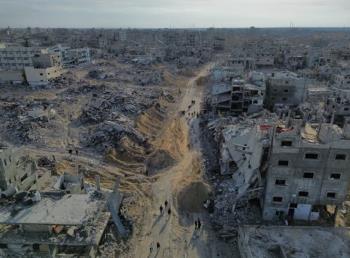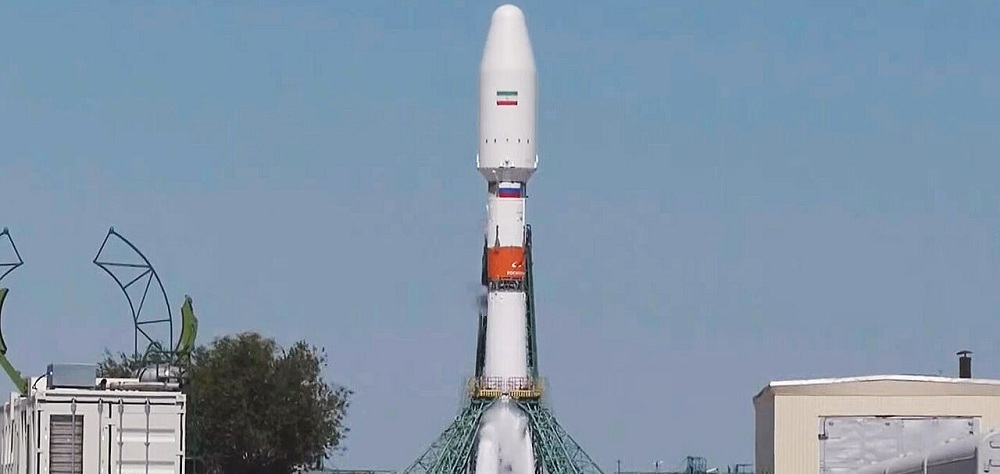Alwaght- Making strides in military technologies in recent years, Iran is now having its word in space technology. Striving for launching into space a domestic satellite for years, today Tehran has managed to do so thanks to its scientists.
In cooperation with Russia, Iran sent into orbit its Khayyam satellite with Russian Soyuz rocket from Baiknour space station. Aimed for 500-kilometer orbit, the satellite took its aimed place in space after 90 minutes. Operated by Iran's Space Organization, Khayyam provides an appropriate platform for sophistication of various sectors of the country with its precise gauges.
According to initial evaluations by experts, the data sent from the satellite show its fine performance. After analyzing the telemetry data, it was also found that the performance of all the subsystems of this satellite are in the appropriate and correct mode and as planned. According to the work schedule, Khayyam satellite will make 4 passes over Iran every 24 hours, during which commands will be sent to the satellite and telemetry data will be received.
The Space Organization said that Khayyam is a "remote sensing satellite" and belongs to Iran and thus takes all of its commands from Iranian space scientists stationed in control bases belonging to the communications and information technology ministry "from day one."
Khayyam is a 600-kilogram satellite that is placed in a 500-kilometer orbit so that for 5 years the data and images sent from it can be used in the fields of agriculture, natural resources, environment, water resources, mines and border monitoring, and management of unforeseen incidents . The Space Organization has emphasized that the rumors about the use of this satellite's images for other countries' military purposes are not true and that the activities and purposes of this satellite are purely peaceful and civilian. The head of the Space Organization stated that it took about $40 million to buildthe satellite. It is said that the satellite is capable of spatial imaging with an accuracy of one meter.
Iran will not only have no imports in this industry in the future, but also thanks to its scientists, it can also become an exporter of this industry, said the Space Organization— something showing that the domestic infrastructure and capacities are well set for progress in this field.
Khayyam revealed to the world Iran's space capabilities. From now on, Iran can watch all activities in the region eagle-eye. The technology is held by a small number of countries and Iran's space achievements show that Western maximum pressure campaign for isolation of the Islamic Republic has been a total failure. Actually, this satellite is a start point and in the future the space will host many Iranian satellites that would take on Western ones. A decade ago when Iran hacked into a state-of-the-art US spy drone and brought it down on its soil unscathed, nobody thought that Iran will once transform into a top drone exporter and therefore this breakthrough will be repeated in space technology.
Deepening Iran-Russia cooperation
The satellite launch not only put Iran in the club of countries with space technology, but also it revealed the scale of partnership with Russia. The satellite launch from the Russian space station marked a new page of bilateral cooperation and showed that the two countries are ready to deepen their cooperation in all areas.
"This marks a turning point in Russian-Iranian bilateral cooperation," said new Russian space chief Yuri Borisov.
The increase in Iran's cooperation with Russia in various military, economic, and now space sectors comes as after Ukraine war, Moscow showed a resolve to upgrade cooperation with its partners especially Iran and in recent months effective steps have been taken to this purpose. Activating North-South Corridor, buying drones from Iran as promoted by Western sources, and the latest case launch of a satellite are steps taken by the Russians to enhance partnership with Iran.
After start of Ukraine war, Russia started scaling down its partnership with the West, including in space. Moscow space officials recently said the country will leave the International Space Station in 2024. It seems that the country plans its own space station. If realized, this plan will intensify the competition with the West in the space and such prospect is driving the Russians to have new partners on board their space platform.
The establishment of domestic Russian space station is an advantage for Iran and Tehran can strengthen its space infrastructure and technological capabilities and play an important role in the new Russian space platform. Iran has been practically away from playing a role in the ISS which was under the control of the West, but due to the strategic alliance it has with Russia, it can use the experience of the Russians in the space and also with the help of Russia, Iranian astronauts can be sent into space to collect information.
Contrary to some perceptions, the launch of Khayyam satellite is not symbolic but marks a step forward in the development of cooperation between Moscow and Tehran. Since the Russian officials have repeatedly said in recent months that they will further strengthen their relations with Iran, by launching the Khayyam satellite, they have shown that they realize their promises and that the level of relations between the two sides will further grow in the future. This is while the US has been struggling to create gaps in the relations between Moscow and Tehran in recent months, but this divisive agenda not only has gone nowhere, but also their ties elevated to a strategic level since Ukraine crisis.
Strengthening the interactions between Russia and Iran in various fields can also send a message for US's Arab allies in the Persian Gulf region, telling them that Moscow, unlike Washington, does not abandon its allies and is ready to help them at all levels, and this issue causes some countries to review their policies with Washington. After the war in Ukraine, the Persian Gulf sheikhdoms have grown suspicious of Washington's support in case of a crisis, and Russia's victory over the West in the military and space sectors can lead countries to converge with Moscow.
American and Israeli concerns
Considering any Iranian breakthroughs a threat to their interests, the US and Israeli regime this time, too, expressed concerns with this Iranian achievement. Reacting to the satellite launch, Washington said that the growing Russian-Iranian partnership poses a deep threat to the international community.
The spokesperson of the US State Department claimed that this country is aware of Russia's action in launching for Iran a satellite with significant spying capabilities.
"Russia deepening an alliance with Iran is something that the whole world should look at and see as a profound threat," the spokesman said.
The US claims that Iranian satellite is for spying purposes, while it has placed dozens of satellites into orbit many years ago, many of which are used to collect confidential information from other countries. Washington is afraid that Iran has acquired this important technology and considers it a threat to itself and its allies.
The Israelis who consider any technological advancement by Tehran as a threat to their existence are terrified by the launch of the satellite. Israeli experts warned that the satellite would provide Iran with the means to monitor targets in Israel. According to the claims of the Israeli media, the cameras installed in this satellite are able to capture high-precision images on the ground, allowing Iran to monitor various Israeli facilities.
The Israelis fear Tehran's data collection from their nuclear facilities for possible retaliation in response to sapotages in Iran by Israeli operatives. The media outlets, citing Israeli officials, said Tel Aviv is extremely concerned about Russia granting Iran the capability for high-quality satellite data collection.
In the past decade, Israeli regime and the US have bent over backwards to prevent Iran from building advanced missiles and drones, but all these measures have failed and now Iran has joined the club of a few countries with satellite capabilities.
Since from now on Iran will possibly keep a close eye on the American and Israeli activities in the region, all of Washington and Tel Aviv plots will be observable to the Iranians. Deploying its spying and security forces to Bahrain and the UAE, the Israeli regime tries to collect data from inside Iran using drones. However, the Khayyam satellite will wreak all of these plots.
Generally speaking, sending the first Iranian satellite into space demonstrated the failure of the Western push to block Iranian journey to scientific and technological advances. Actually, the more these pressures increased, the more Iranian breakthroughs have been, and with the in-the-making strategic alliance between Iran and Russia, these advances can elevate to new heights in the future.



























